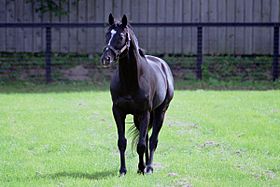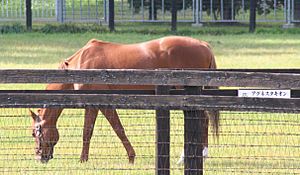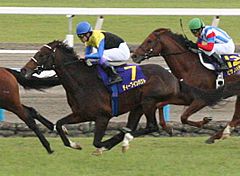Sunday Silence facts for kids
Quick facts for kids Sunday Silence |
|
|---|---|

Sunday Silence at Shadai Stallion Station Hayakita(Abira), Hokkaido, Japan.
|
|
| Sire | Halo |
| Grandsire | Hail To Reason |
| Dam | Wishing Well |
| Damsire | Understanding |
| Sex | Stallion |
| Foaled | March 25, 1986 Paris, Kentucky, U.S. |
| Died | August 19, 2002 (aged 16) Abira, Hokkaido, Japan |
| Country | United States |
| Color | Black/Brown |
| Breeder | Oak Cliff Thoroughbreds, Ltd. |
| Owner | H-G-W Partners Racing colors: Gray, yellow sash, sleeves and cap |
| Trainer | Charlie Whittingham |
| Record | 14: 9–5–0 |
| Earnings | $4,968,554 |
| Major wins | |
| Santa Anita Derby (1989) San Felipe Stakes (1989) Super Derby (1989) Californian Stakes (1990) American Triple Crown wins: |
|
| Awards | |
| U.S. Champion 3-Year-Old Colt (1989) United States Horse of the Year (1989) Leading broodmare sire in North America (2016, 2019) |
|
| Honors | |
| United States Racing Hall of Fame (1996) #31 – Top 100 U.S. Racehorses of the 20th Century Sunday Silence Stakes in Louisiana Downs Leading sire in Japan 1995 through 2007 |
|
| Last updated on January 12, 2008 | |
Sunday Silence (born March 25, 1986 – died August 19, 2002) was a famous American-bred Thoroughbred racehorse. He was also a very successful breeding stallion. In 1989, he won two big races, the Kentucky Derby and the Preakness Stakes. He almost won the Triple Crown, but he was defeated in the Belmont Stakes.
Later that same year, Sunday Silence won the Breeders' Cup Classic. He was named the best three-year-old male horse and the overall best horse in America for 1989. His racing career was known for his exciting rivalry with another great horse, Easy Goer. Sunday Silence won three out of their four head-to-head races. Both horses later became members of the American Hall of Fame.
After he stopped racing, Sunday Silence was sent to Japan. There, he became an incredibly successful breeding stallion. He was the top sire (father of racehorses) in Japan for thirteen years. His children and grandchildren have won many important races around the world. Sunday Silence was ranked #31 on the list of the Top 100 U.S. Racehorses of the 20th Century.
Contents
Early Life and Challenges
Sunday Silence was born on March 25, 1986, in Paris, Kentucky. His father was a horse named Halo, and his mother was Wishing Well. Even though he was officially listed as dark bay or brown, he was actually a true black horse.
He faced danger twice when he was young. First, as a baby horse, he almost died from a strange virus. Later, when he was two years old, the van he was traveling in crashed after the driver had a heart attack. Luckily, Sunday Silence survived both times.
He was offered for sale twice as a young horse but didn't sell. Finally, he was sold for $50,000 when he was two years old. His original breeder, Arthur B. Hancock III, bought him back. He wanted to send Sunday Silence to Kentucky, but the van accident kept the horse in California.
Hall of Fame trainer Charlie Whittingham bought half of the horse. Then, he sold half of his share to Dr. Ernest Gaillard. This group of owners was called H-G-W Partners.
Who Owned Sunday Silence?
The name H-G-W Partners stood for the three people who owned Sunday Silence. They were:
- Arthur B. Hancock III: He owned 50% of the horse. He is a horse breeder and owns Stone Farm in Kentucky.
- Charlie Whittingham: He owned 25% of the horse. He was Sunday Silence's Hall of Fame trainer.
- Dr. Ernest Gaillard: He owned 25% of the horse. He was a medical doctor and helped organize the Kentucky Derby race.
Sunday Silence's Racing Career
1988: Two-Year-Old Races
Sunday Silence showed talent, but he started racing a bit later than some horses. In his first year of racing, he competed three times. He finished second twice and won one race.
1989: Three-Year-Old Races
Sunday Silence started his three-year-old season with a win. He then won the San Felipe Stakes and the Santa Anita Derby. These wins helped him qualify for the famous Kentucky Derby.
Kentucky Derby Victory
Before the 1989 Triple Crown races, a big rivalry grew between Sunday Silence (from the West Coast) and Easy Goer (from the East Coast). Easy Goer had been named the best two-year-old horse in 1988.
They first met in the 1989 Kentucky Derby on May 6. The track was muddy that day. Sunday Silence and his jockey, Pat Valenzuela, beat Easy Goer by two and a half lengths. Many experts believed Sunday Silence was the better horse that day.
Preakness Stakes Thriller
Two weeks after the Derby, both horses had small health issues. Sunday Silence had a bruised foot, but his trainer, Charlie Whittingham, got him special shoes. These shoes helped him recover quickly. Easy Goer also had some foot problems.
Despite these issues, the race was on! Sunday Silence won again, this time by just a nose, after a fierce battle with Easy Goer down the final stretch. Many experts called this race the "Race of the Half Century" because it was so exciting.
Belmont Stakes Loss
The Belmont Stakes is the longest of the Triple Crown races. In New York, where the Belmont is held, horses were not allowed to race on any medications. This was different from other states.
The day before the race, Sunday Silence's trainer, Charlie Whittingham, was accidentally kicked in the head by Sunday Silence. It was a scary moment, but the trainer was okay.
In the Belmont Stakes, Easy Goer beat Sunday Silence by eight lengths. This win stopped Sunday Silence from winning the Triple Crown. Easy Goer's time was the second-fastest in Belmont Stakes history, only behind the legendary Secretariat. Even though Sunday Silence didn't win the Triple Crown, he still earned a $1,000,000 bonus for being the best three-year-old in the series.
Breeders' Cup Classic Showdown
After the Belmont, Sunday Silence won the Super Derby. This set up one last race against Easy Goer in the $3 million Breeders' Cup Classic. This race would decide which horse would be named Horse of the Year.
Sunday Silence won by a neck over Easy Goer in another thrilling finish. This victory meant Sunday Silence had won seven out of nine races in 1989. He earned a record $4.59 million that year. Because of his amazing season, he was named the American Champion Three-Year-Old Colt and the American Horse of the Year.
Even after these awards, people still debated which horse was truly better. Both Sunday Silence and Easy Goer were considered great horses. In 1996, Sunday Silence was inducted into the National Museum of Racing and Hall of Fame. He was ranked #31 among the top 100 U.S. Racehorses of the 20th Century, while Easy Goer was #34.
Sunday Silence was the first horse to win three parts of the "Grand Slam of Thoroughbred Racing" in the same year. This Grand Slam includes the three Triple Crown races plus the Breeders' Cup Classic.
1990: Four-Year-Old Races
At four years old, Sunday Silence won the Californian Stakes. He then finished second in the Hollywood Gold Cup. He suffered a leg injury that led to his retirement from racing. In his career, he raced 14 times, winning nine races and finishing second in the other five.
Life as a Breeding Stallion
Sunday Silence was sold to a Japanese breeder named Zenya Yoshida. He went to live at Yoshida's Shadai Stallion Station in Japan. Yoshida bought Sunday Silence for $7.5 million in 1991.
Sunday Silence became incredibly successful in Japan. He was the leading sire (meaning his children won the most money) from 1995 to 2008. This was a new record! His children have won many important races in Japan and around the world, including races in Australia, France, the United Kingdom, Hong Kong, the United States, and Dubai.
His children have earned a huge amount of money, partly because there are many horses in Japan and the prize money for races there is very high.
Famous Children of Sunday Silence
Many of Sunday Silence's children became famous racehorses themselves. Some of his most successful offspring include:
- Fuji Kiseki (born 1992): Won the Asahi Hai Futurity Stakes.
- Genuine (born 1992): Won the Satsuki Shō and Mile Championship.
- Dance Partner (born 1992): Won the Yūshun Himba and Queen Elizabeth II Cup.
- Tayasu Tsuyoshi (born 1992): Won the Tokyo Yūshun.
- Silence Suzuka (born 1994): Won the Takarazuka Kinen.
- Stay Gold (born 1994): Won the Hong Kong Vase and Dubai Sheema Classic.
- Special Week (born 1995): Won the Tokyo Yūshun, Japan Cup, and Tennō Shō.
- Manhattan Cafe (born 1998): Won the Kikuka Shō, Arima Kinen, and Tennō Shō.
- Neo Universe (born 2000): Won the Satsuki Shō and Tokyo Yūshun.
- Still in Love (born 2000): Won the Oka Shō, Yūshun Himba, and Shūka Shō.
- Zenno Rob Roy (born 2000): Won the Japan Cup, Arima Kinen, and Tennō Shō.
- Deep Impact (born 2002): One of his most famous sons. He won many major races, including the Satsuki Shō, Tokyo Yūshun, Kikuka Shō, Japan Cup, and Arima Kinen.
Sunday Silence's Sons as Fathers
Many of Sunday Silence's sons also became successful breeding stallions. At least seventeen of them have fathered horses that won major races. Some of these important sons include:
- Fuji Kiseki
- Dance in the Dark
- Stay Gold
- Special Week
- Manhattan Cafe
- Neo Universe
- Zenno Rob Roy
- Daiwa Major
- Hat Trick
- Deep Impact (who became an even more successful sire than his father!)
- Gold Allure
- Heart's Cry
- Black Tide
Sunday Silence's influence continues through his children and grandchildren, who are still winning big races around the world today.
Death
Sunday Silence died on August 19, 2002. He had been sick with a foot condition called laminitis for several weeks. He also developed an infection in his leg. He passed away peacefully, likely from heart failure.
Sunday Silence in Pop Culture
Sunday Silence is so famous that he appears in the horse racing game Derby Owners Club. Players can choose him as a father for their virtual horses in the game. He is also featured on official game cards.
 | Aaron Henry |
 | T. R. M. Howard |
 | Jesse Jackson |



